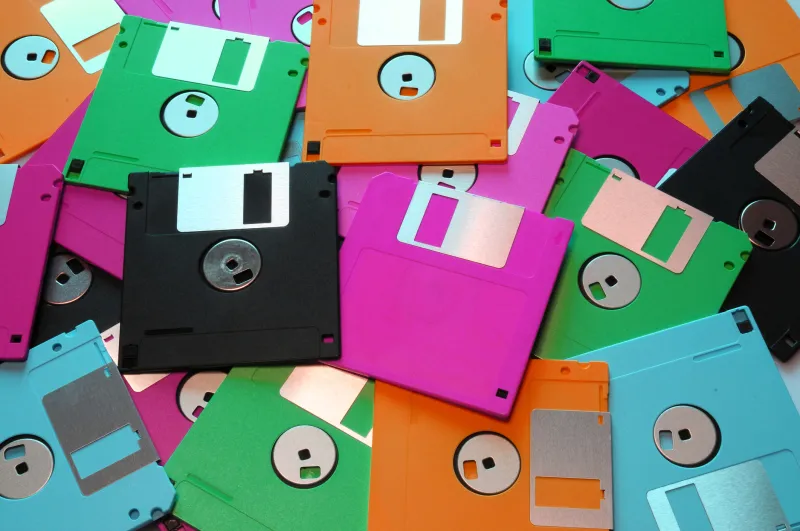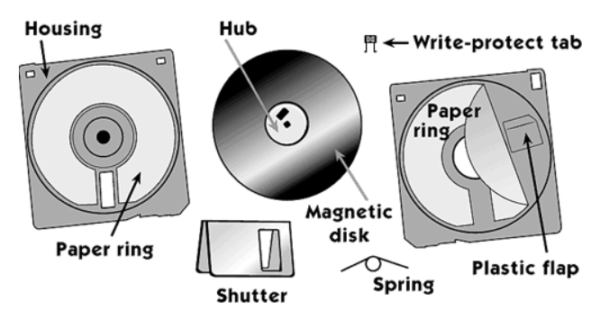
Credit: Getty Images/EyeEm
Brief history of floppy disk disposal
Floppy disks, also known as zip disks, discs, diskettes, or new floppies, were introduced in the late 1960s as a way to store and transfer data. Floppy disks were once the go-to storage medium for computers. They revolutionized data storage but have since been replaced by more advanced technologies.
Importance of responsible floppy disk disposal
If you have been using computers for quite some time, you are likely to have a pile of old and used floppy disks stashed in one corner of your home or office. As technology evolves, it’s crucial to consider the environmental impact of outdated storage devices like floppy disks. Responsible disposal can help prevent harmful materials from ending up in landfills and protect our planet. Besides disks have some chemical poses. These chemicals pose a risk to both human health and ecosystem balance. Furthermore, failing to securely dispose of floppy disks can result in data breaches and compromised personal or sensitive information.
The environmental impact of floppy disks
Floppy disks are made from a combination of plastic, metal, and magnetic materials. The manufacturing process involves using toxic chemicals and energy-intensive procedures.
Harmful materials used in production of floppy disks

The production of floppy disks involves the use of harmful chemicals such as PVC, polystyrene, and brominated flame retardants, which can be detrimental to the environment if not disposed of properly.
Discussion on the long decomposition period of floppy disks
Floppy disks are not biodegradable and can take up to hundreds of years to decompose in landfills, contributing to the growing e-waste problem.
The risks of improper floppy disk disposal

Credit: IStock
The potential release of toxic chemicals into the environment
Improper floppy disk disposal can lead to the release of toxic chemicals into the soil and water, posing a threat to both human health and the ecosystem.
Data security concerns
Improperly floppy disk disposal without destroying the data stored on them can expose sensitive information to unauthorized access. Protecting data privacy should be a top priority.
Responsible floppy disks disposal methods
When it comes to getting rid of your floppy disks, it’s important to consider responsible disposal methods One way to recycle floppy disks is by donating or selling them to organizations that can reuse them. Many schools, libraries, and non-profit organizations still use floppy disks for various purposes
Donating or selling to organizations that can reuse them
One way to recycle floppy disks is by donating or selling them to organizations that can reuse them. Many schools, libraries, and non-profit organizations still use floppy disks for various purposes. Consider donating or selling your old floppy disks to organizations that can repurpose them for educational or artistic purposes. Many schools, libraries, and non-profit organizations still use floppy disks for various purposes and may accept any quantity of disks and even reimburse you for shipping costs. So, you can send more than 200 disks. Also, some of them provide you with prepaid shipping labels, making it easy to send your discs without hassle.
Recycling options
When recycling floppy disks, it’s crucial to separate them from other recyclable materials, such as CDs or DVDs, as they require different recycling processes. If you have floppy disks sitting around, don’t let them go to waste. Consider repurposing them as quirky pen holders or send them to recycling centers where they can be properly disposed of or recycled.
Finding local recycling centers of floppy disks
Simply destroying the external floppy disk or throwing let’s say two floppy disks together with regular waste creates the possibility of data breaches. But it’s not a good idea. A good way is to recycle old floppy disks.
It would be great if you will research a local recycling centre that accepts floppy disks for recycling. Many recycling centers have special e-waste programs where you can safely dispose of your old disks. Make sure to check if they accept floppy disks specifically, as some centers might only recycle CDs and DVDs.
If you want to earn some money, you can disassemble the iron parts and take them to recycling center.
If recycling is not available in your area, you can destroy floppy disks yourself. One interesting thing I discovered in researching this topic is that you can use lighter fluid to break down the plastic casing and expose the metal piece inside. Then, run a magnet over the disk to scramble the data. Once destroyed, dispose of the floppy disks in a metal trash bin coated with iron oxide to prevent data recovery.
Mail-in recycling programs
Companies like Greendisk offer mail-in recycling programs specifically for floppy disks and other electronic waste. They provide a convenient way to recycle your old disks, even if you have a large quantity.
Properly destroying the data
To ensure data security, it’s important to properly destroy the data on your floppy disks before disposing of them. Physical destruction methods, such as shredding or using a neodymium magnet, can render the data irretrievable. Even if you think the information on the disks is unusable, it’s crucial to remember that data can still be recovered.
Preserving and transferring data from floppy disks
If you have valuable data stored on floppy disks, it’s crucial to preserve it before disposing of the disks. This can include important documents, vintage software, or personal memories.
One effective way to destroy data is by physically destroying the floppy disk. You can break it apart or cut it into small pieces using scissors or a shredder, some people are burning floppy disks. Remember to handle the broken pieces carefully as they may have sharp edges. On the other hand, you can use a computer with a floppy disk drive to reformat the disks.
Transferring data to more modern storage devices
You can transfer the data from floppy disks to more modern storage devices, such as USB drives or external hard drives. Floppy disk drives or USB adapters can facilitate the data transfer process. Or If you still have access to an old computer with a functional floppy disk drive, you can transfer the data directly from the floppy disks to a computer. Some programs even accept large quantities of floppy disks or other electronic items, making it easier to dispose of them responsibly.
Using floppy disk drives or USB adapters
If your computer still has a floppy disk drive, you can use it to read the data from the floppy disks and transfer it to a USB drive or other storage devices.
Seeking professional data recovery services
If you’re unable to access the data on your floppy disks or don’t have the necessary equipment, consider seeking professional data recovery services. They can help you retrieve the data safely and efficiently.
The future of floppy disks and data preservation In this digital age, where technology advances at an astonishing pace, it’s natural to wonder about the fate of outdated storage devices like floppy disks. With the advent of cloud storage and the continuous upgrade of hardware, it’s easy to dismiss these relics of the past. However, there are still valid reasons for considering the future of floppy disks and data preservation.
Increased adoption of cloud storage
One of the primary reasons for the decline of floppy disks is the increased adoption of cloud storage. With the convenience and accessibility it offers, many individuals and businesses have transitioned to storing their data on remote servers. Cloud storage eliminates the need for physical storage devices, including floppy disks, and provides an efficient way to access and share files across multiple devices.
Maintaining legacy systems for historical purposes
While floppy disks may no longer serve as a practical storage solution for everyday use, they still hold value for preserving historical data. Many individuals and organizations maintain legacy systems that rely on floppy disks to access important information or historical records. These systems may include ancient computers or specialized equipment that cannot be easily upgraded or replaced. By keeping these legacy systems operational, we ensure the preservation of valuable data for future generations.
Tips and Warnings
- Make a stand using either a CD case or some old CDs and place your floppy disks inside for decoration.
- Overall you need to ensure you have removed any valuable data before disposal. Once you have done so, make sure to appropriately recycle your floppy disks, rather than just throwing them in the bin.
- Use a solid metal trash bin or a burn barrel. Place the floppy disks inside and light them with a long lighter. You may need to use some lighter fluid and paper or cardboard kindling to get the fire going.
- However, because the recycling of floppy disks is cumbersome, it is possible that you do not find recycling centers involved in recycling floppy disks in your locality.
- You will want to run the magnet all over the floppy disk multiple times to scramble the data rendering it unusable.
- You can find floppy drives that connect to your computer by USB port on Amazon – they aren’t pricey.
- The problem with floppy disks is that their magnetic coating degrades over time and becomes unreadable by both humans and machines alike.
- Since floppy disks utilize magnetic storage (not unlike tape), it’s safe to say that eventually, the magnetism will wear out around the same time a tape would.
- A 3½-inch disk is a little different. The device has a metal piece in the center, called a hub, which holds the disk in place while it spins. There is also a metal tab called a shutter that moves to the side once it is in a computer to give the machine access to the data.
Conclusion
In conclusion, the future of floppy disks lies in their continued relevance for specific use cases. While the majority of users have moved on to more advanced storage options like cloud storage and USB drives, there are still instances where floppy disks play a vital role. Whether it’s for historical preservation or maintaining legacy systems, the need to preserve and access data stored on floppy disks remains.
Responsible floppy disks disposalis essential for minimizing environmental impact and ensuring data security. By recycling or repurposing these obsolete storage devices, we can contribute to a cleaner and more sustainable future. So, don’t let your old floppy disks gather dust – recycle or repurpose them today!
For those looking to recycle their floppy disks, there are several options available. Many recycling centers accept old floppy disks as part of their e-waste recycling programs. Additionally, there are specialized companies like FloppyDisk.com that offer a convenient way to send your old floppies for proper recycling. Simply fill out their reimbursement form, package your disks, and send them off. This ensures that your floppy disks are recycled responsibly and kept out of landfills.
If you’re wondering what to do with your old floppy disks that are no longer usable, consider repurposing them for craft projects. The distinctive shape and nostalgic appeal of floppy disks make them a popular choice for various art projects. You can also destroy the data on the disks by reformatting them or physically destroying them. However, be cautious when burning your floppy disks, as the fumes can be toxic. It’s always recommended to follow proper safety guidelines and find a company or recycler that specializes in handling old storage media.
So, if you want to get rid of your floppy disks, remember to consider recycling them responsibly. Whether you choose to recycle them at a local recycling center, send them to specialized recyclers, or repurpose them for craft projects, there’s a way to ensure that your old floppy disks don’t end up in a landfill. Let’s embrace what’s called “progress” in the computer world while also respecting the history and environmental impact of outdated technology. So, next time your floppy disks get old and unusable, you should remember to package them for recycling.
